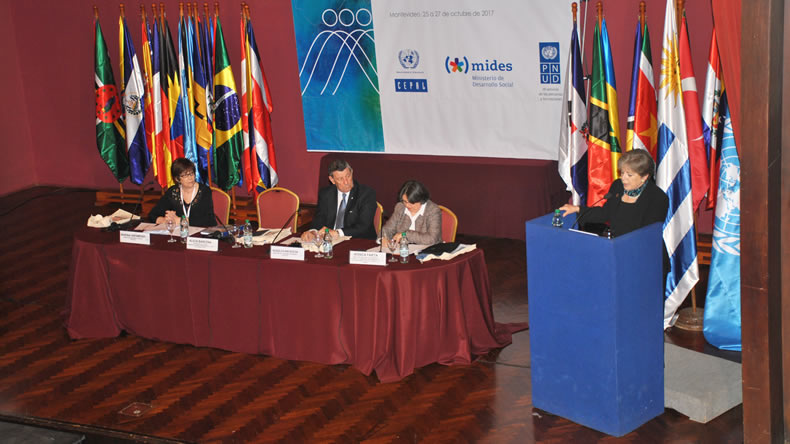
30 Sep-3 Oct 2019 Cidade do México, Mexico | Conferences and meetings of subsidiary bodies

On Wednesday, the Second Meeting of the Regional Conference on Social Development in Latin America and the Caribbean, which is a subsidiary body of ECLAC, was inaugurated in Montevideo with a call for articulating economic, social and environmental policies to achieve dual social and labor inclusion in the region, based on the need for a change in the development pattern.
The ceremony was led by Rodolfo Nin Novoa, Uruguay’s Foreign Minister, who spoke on behalf of President Tabaré Vázquez; Alicia Bárcena, Executive Secretary of the Economic Commission for Latin America and the Caribbean (ECLAC); Marina Arismendi, Uruguay’s Minister of Social Development; and Jessica Faieta, the United Nations Development Programme (UNDP) Regional Director for Latin America and the Caribbean.
“For democracy not to be an empty promise, it must ensure a basic floor for social cohesion that guarantees the inclusion and integration of all citizens,” said Foreign Minister Rodolfo Nin Novoa, who reaffirmed his country’s commitment to social development. “Is there economic development without social inclusion? Can we talk about economic growth based solely on the increase in per capita GDP? We understand that we cannot; development is attained through well-being and greater access to opportunities for all, without leaving no one behind,” he stated.
In a show of the cross-cutting commitment by Uruguay’s cabinet, other officials present at the inaugural event included Danilo Astori, Uruguay’s Minister of Economy and Finances; Ernesto Murro, Minister of Labor and Social Security; Guillermo Moncecchi, interim Minister of Industry, Energy and Mining; Edith Moraes, interim Minister of Education and Culture; and Cristina Lustemberg, Deputy Minister of Public Health. They were joined by Lidia Brito, Director of the UNESCO’s Regional Office for Latin America and the Caribbean.
In addition to recognizing Uruguay’s important achievements on social development and thanking it for organizing the conference, Alicia Bárcena stressed that “not all social matters play out in the social sphere.” ECLAC, she said, sustains that inequality is strongly conditioned by the productive matrix and the culture of privilege that characterizes the region.
In a scenario of modest economic growth, Bárcena said, it is necessary to redouble efforts to avoid rollbacks in terms of reducing poverty and inequality and to be able to achieve the commitments of the 2030 Agenda, which call for leaving no one behind.
“Social development is an investment with positive returns for economic growth and environmental protection. We must invest in education, nutrition, health, social protection and the development of capacities to increase the productivity of workers,” ECLAC’s most senior representative stated.
In the same vein, Minister Arismendi highlighted the need to link macroeconomic and social policies to guarantee the well-being of the population. “We have to address all the structuring axes of social inequality” with a focus on rights, centered on the different stages of people’s life cycle, she said. “There is no development without equality. We have to work to eliminate the machine of inequality.”
In addition to emphasizing the inter-agency collaboration between ECLAC and the UNDP to organize the conference, Jessica Faieta recalled that more than one third of the population of Latin America and the Caribbean is in a situation of economic vulnerability and that cases of “hard-core exclusion” cannot be resolved with economic growth alone but instead require policies for inclusion, non-discrimination and affirmative action.
The meeting – which is taking place in facilities of the Secretariat of the Southern Common Market (MERCOSUR) in Montevideo and will conclude on Friday – is being attended by ministers and other senior government authorities from the region, as well as representatives of civil society and academia.
In the framework of the event, ECLAC is presenting the document Linkages between the social and production spheres: Gaps, pillars and challenges, which sustains that the region must move toward a virtuous circle of development in which productive diversification, progressive structural change and the environmental push are accompanied by inclusive social development.
Created in 2014, the Regional Conference on Social Development is one of ECLAC’s nine subsidiary bodies. Its aim is to promote the improvement of national policies on social development and international, regional and bilateral cooperation on social matters as well as to make progress on measuring the diverse dimensions of poverty, inequality and the structural gaps that persist in the region.
More information:
Queries related to press coverage of the meeting should be directed to Guido Camú, Officer-in-Charge of ECLAC’s Public Information Unit.
Email: prensa@cepal.org; Telephone: (56 2) 2210 2040; Cell phone: (56 9) 8 293 2602.
Follow us on: Twitter, Facebook, Flickr, YouTube and Google+.